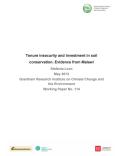This study on innovative sanitation financing recognizes the challenge facing the region, to halve the proportion of the population without access to sanitation by 2015. The study proposes a “paradigm shift” to outcome models, recognizing that sanitation not only remains a focus of international development targets but is also linked to many other development issues such as health, environment, education, gender, disability, tourism and economic growth. This study proposes the inclusion of the private sector in a value proposition, with everyone in society benefiting from improved sanitation, and generating the willingness to pay for these services. ESCAP published this discussion paper, targeted for discussions at the Second Asia-Pacific Water Forum (2APWS), in Chiang Mai, May 2013, to provide background materials for the discussions at both the Technical workshops and the Focus Area Sessions.
This report analyses the social dimensions of the Republic of Macedonia's green growth strategy using a Participatory Scenario Development (PSD) methodology. The report provides a summary of the major challenges faced by the Republic of Macedonia in terms of social-economic development, demographic development and climate change, future development scenarios, with breakdowns by sector, and recommendations with respect to green growth strategy development. The report is part of the World Bank's support to the Macedonian government through the "FYR Macedonia Green Growth and Climate Change Analytic and Advisory Support Program".
Although gender considerations are relatively new in the climate change discourse, it is hardly surprising that they have been at the heart of recent activism and policy advocacy efforts by multiple actors. Socio-economic research and evaluations of development effectiveness both confirm that access to resources and the agency to use them are influenced by gender roles, responsibilities and differential access to opportunities and influence
The findings of this research reveal the key role of informal and formal institutions in the local responses to climate change and, correlatively, the need for institutional strengthening as well as innovation in the existing ‘traditional’ coping strategies for climate shocks and hazards. The research findings also highlight the importance of gender inequalities as major social barriers to the development of adequate adaptation strategies by and for women.

